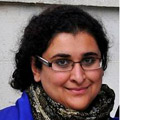 After years of planning and plotting, I was finally getting ready to head off to India. This was going to be a voyage of discovery; I was going to explore my roots, live village life, and hopefully, “do a bit of good.” I arrived at Hyderabad’s shiny new airport—complete with a WH Smith and a sign saying that Starbucks would soon be here!
After years of planning and plotting, I was finally getting ready to head off to India. This was going to be a voyage of discovery; I was going to explore my roots, live village life, and hopefully, “do a bit of good.” I arrived at Hyderabad’s shiny new airport—complete with a WH Smith and a sign saying that Starbucks would soon be here!
Hyderabad is a great city. It manages to be buzzing, chaotic, and polluted, but at the same time refined, courteous, and fun. For the next four months it was my weekend home. My first few days of orientation flew by in a whirl of meetings, walks, talks, and ludicrously good food. Then on a Monday morning, accompanied by a 16 year old volunteer, and armed with a shiny new tablet computer, and a big bag of medicines, I was dropped off at the white fondant fantasy train station by the fantastically energetic director of the charity. My mission according to her was very simple: “Just make it better!”
We were picked up at the other end by Raju, our driver and general logistics aide, and transported in a brief period of air conditioned luxury to the village of Dokur. When the Institute of Rural Health Studies (IRHS) first started working here, they operated out of a cow shed and now they have a comfortable clinic set up with a well stocked basic pharmacy and a basic laboratory. There are separate examination rooms, hand washing facilities, and chronic disease registers. (Ah yes, someone with QOF experience has been here before).
The clinic itself is run by Shivaiah, the senior paramedic, who is responsible for organising everything that the volunteers need. I was greeted with wide smiles and handshakes and the welcome, “Oh good, you are here. We told all the complicated patients to come back today because there was a new doctor coming!” And just like that, it was as if I’d never left home. Admittedly, I was not sure how clearly things were being translated and I was a little worried by the complete lack of privacy, but diabetes and hypertension are the same all over the world and when your cauda equina patients come in to see you with not just one, but two or three MRI scans then there is little agonising over what to do next.
You might be wondering about the 16 year old volunteer and the tablet computer. Well, she was there to introduce the staff to the digital age with a view to going paper free. But for week one, we concentrated on washing our hands in between patients, and trying to avoid the cows and their pats on our way home.
Farah Kidy was born in Malawi and moved to the UK in 1994. She studied medicine and martial arts at the University of Glasgow and after a period of trying different things decided to start a career in General Practice. She has recently completed a Masters degree in tropical medicine and international health at the London School of Hygiene and Tropical Medicine. She has just returned from a short period of voluntary work in India.
